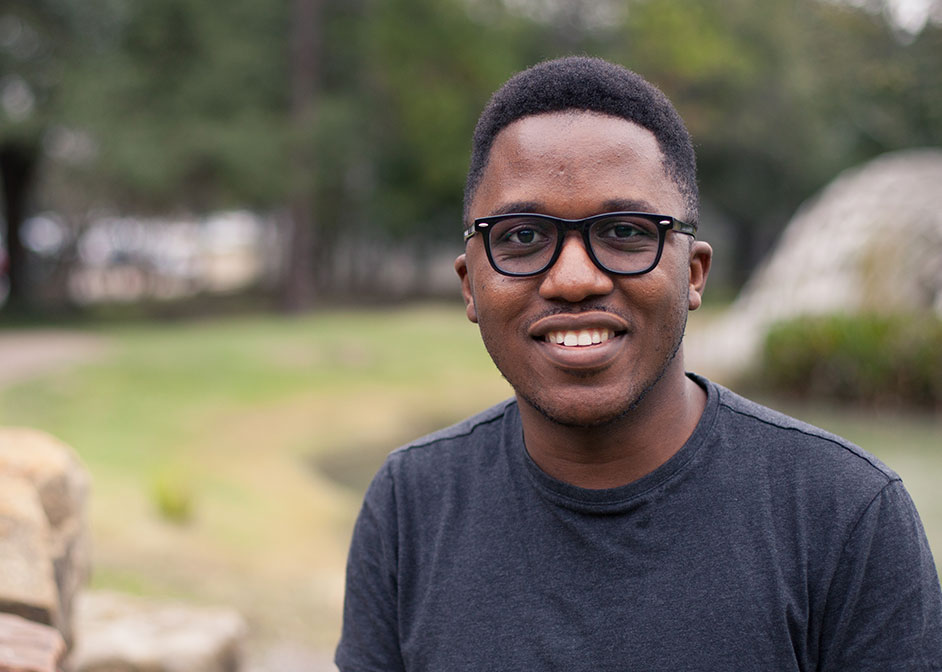Lucien Nana Yobo Will Pursue More Paleoclimatology Research and International Collaborations
Funding and finances can be a burden for graduate students. For many, the way to stay afloat is to take a teaching assistant position. And for students like Lucien Nana Yobo, who work with collaborators at different universities and labs, this can be an additional challenge.

“Being able to get your own funding gives you a sense of pride,” said Nana Yobo, a University of Houston geology Ph.D. student. “It gives you flexibility to do what you want to do. It frees up your time so that way your research activities are not really hampered by your teaching engagements, the things you have to do.”
Nana Yobo recently received a $20,000 GEM Fellowship from the National GEM Consortium, an organization that aims to increase the participation of underrepresented groups at the master’s and doctoral levels in science and engineering.
He will use the fellowship to further his study and research of paleoclimatology with
his advisor, Alan Brandon, geology professor at UH’s College of Natural Sciences and
Mathematics.
Brandon said Nana Yobo matures each year as a scientist and is particularly impressed
with his lab work.
“What we do is highly specialized, yet when I have asked for very specific, high-quality measurements that no other lab can do, Lucien has developed techniques to meet those requirements,” said Brandon.
Isotopes Point the Way to Understanding Past Geologic Events
Nana Yobo studies the Late Cretaceous Ocean Anoxic Event 2, a sustained period about 94 million years ago when the world’s oceans were depleted of oxygen and there was high atmospheric carbon dioxide, resulting in the warming of the global climate.
Specifically, Nana Yobo is researching weathering effects on the anoxic event. He looks at how rivers that ran across continents and weathered rocks as they traveled, deposited nutrients into the oceans.
He studies this through various isotope systems. In a sense, he said, he is performing isotope geochemistry by taking a closer look at strontium, calcium, iron and magnesium isotopes in carbonate rocks.
These isotopes point the way to understanding what caused ocean anoxia, which in turn could ultimately paint a clearer picture of future global climate change.
“As we work on modeling possible scenarios of the cause of Ocean Anoxic Event 2,” Nana Yobo said, “we can use what we have learned to predict what the future might look like in the scenario where we have higher temperatures on the continent than usual, similar to the time of the anoxic event.”
Further aiding his research endeavors is a National Science Foundation grant for $212,443 that Brandon received this summer to work on the isotopes.
In the summer of 2017, Nana Yobo had the opportunity to attend the Urbino Summer School in Paleoclimatology in Urbino, Italy. It is considered to be the best course in paleoclimatology.
Research Around the Country and World
Nana Yobo is looking forward to collaborations with other scientists as well. Thanks to the GEM Fellowship, he will work on magnesium isotopes at Princeton University and calcium isotopes at the University of Saskatchewan in Canada. After that, he will study iron isotopes at the University of Cambridge in England and then perform data modeling with a professor at Pennsylvania State University.
He thanks Brandon for his mentorship during his graduate studies.
"He’s been a great facilitator, because he’s been able to help me succeed in what I want to do,” said Nana Yobo. “Case in point, helping me apply for multiple sources of money to be able to fund research. Dr. Brandon will go above and beyond to see that you succeed.”
In turn, Brandon praises Nana Yobo’s skills and is assured he has the qualities necessary to achieve at the highest level as a scientist.
"He has a strong grasp on the complex problem he is working on and knows what to do,” said Brandon. “On the lab side, he also knows how to develop and push the frontiers to get the best data possible. This combination of understanding and lab capabilities means he is doing cutting-edge science that will help drive his field.”
Nana Yobo plans to graduate next May and will seek a postdoctoral position to continue his paleoclimatology research.
- Rebeca Trejo, College of Natural Sciences and Mathematics